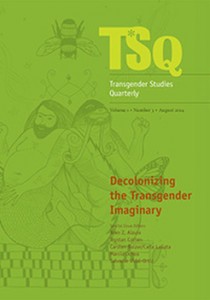 TSQ: Transgender Studies Quarterly
TSQ: Transgender Studies Quarterly
Trans*historicities
Issue Editors:
Leah DeVun and Zeb Tortorici
This issue of TSQ explores gender crossings that precede the terms “transgender” and “transsexual.” Drawing on Susan Stryker and Aren Aizura’s formulation of trans-historicity, we propose a theoretical and methodological imagining of what constitutes trans* before the advent of the terms that scholars generally look to for the formation of modern conceptions of gender, sex, and sexuality. What might we find if we look for trans* before trans*?
While some historians have rejected the categories of “transgender,” “transsexual,” and even “sexuality” to speak of experiences before the twentieth century, others have laid unabashed ancestral claim to those living gender-non-conforming lives in the ancient, medieval, and early modern periods. As early as Leslie Feinberg’s 1992 TransgenderLiberation, scholars and activists have looked to the distant past for antecedents that might legitimate and inform present trans* identities. More recently, scholars have pointed to the genealogical significance of cross-dressers, hermaphrodites, bearded women, and others who have confounded binary gender, charting continuities and discontinuities with respect to current notions of queer and trans* subjectivity.
Thinking trans*historically allows us to frame past bodies, forms, and essences through their multiple points of category formation and identity. While keeping gender, sex, and sexuality in our focus, we are sensitive to the ways in which such categories intersect with other states of being in earlier periods. By using the concept of trans*historicity, we aim to draw together past and present trans* phenomena while also emphasizing the historical specificity and variability of gendered systems of embodiment in different time periods. What scholarship currently explores trans* issues in the past? How does such work handle the tension between, on the one hand, historicism, and, on the other hand, queer temporality and asynchronicity? We hope to take stock of the field as it exists at this formative moment.
We welcome proposals on a wide range of trans* historical topics that invite us to think outside contemporary concepts, categories, and terminologies (through trans/queer temporalities, heterochronicities, temporal drag, etc.). Proposals might consider:
Ontological categories, e.g. divine, human, animal, plant, and mineral beings
Metamorphosis, hybridity, and monstrosity
Witchcraft, magical transformations, and shape-shifting
Queer temporalities, touches across time, and “backward feelings”
Transubstantiation, transmutation, and mixed states
Hermaphrodites, cross-dressers, viragoes, and sodomites
Non-binary grammatical concepts
Travel, migrations, and conversions
Religious, ethnic, and racial differences
Scientific, medical, legal, and penal contexts
Trans*historical activism and/or archival practice
The expected length for scholarly articles is 5,000 to 7,000 words, and 1,000 to 2,000 words for shorter works. All manuscripts should be prepared for anonymous peer review. For articles engaging in scholarly citation, the Chicago author-date citation style will be required for publication. Any questions should be addressed by e-mail to the editorial office: tsqjournal@gmail.com.
To submit a manuscript, please visit http://www.editorialmanager.com/tsq. The deadline for submissions is June 1, 2017. Please note that TSQ does not accept simultaneous submissions. If this is your first time using Editorial Manager, please register first, then proceed with submitting your manuscript. All manuscripts must be double-spaced, including quotations and endnotes, and blinded throughout. You must also submit an abstract (150 words or less), keywords (3-5 for indexing), and a brief author’s biographical note (50 words or less) at the time of initial submission. Please visit http://www.dukeupress.edu/Assets/Downloads/TSQ_sg.pdf for a detailed style guide.
TSQ: Transgender Studies Quarterly is co-edited by Paisley Currah and Susan Stryker, and published by Duke University Press, with editorial offices at the University of Arizona’s Institute for LGBT Studies. TSQ aims to be the journal of record for the interdisciplinary field of transgender studies and to promote the widest possible range of perspectives on transgender phenomena broadly defined. Every issue of TSQ is a specially themed issue that also contains regularly recurring features such as reviews, interviews, and opinion pieces. To learn more about the journal and see calls for papers for other issues, visit http://lgbt.arizona.edu/transgender-studies-quarterly For info about subscriptions, visit http://www.dukeupress.edu/Catalog/ViewProduct.php?productid=45648.



